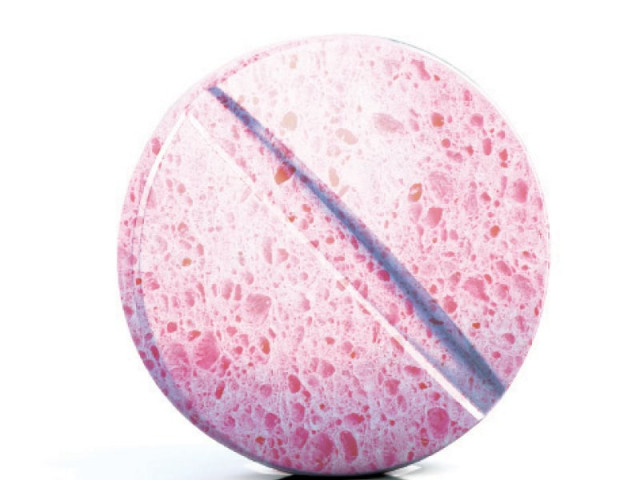Saving mothers: The Rs10 wonder drug
Gynaecology experts, associations, local & international, mark inclusion of Misoprostol on list of essential drugs.

"In home births, without a skilled attendant, Misoprostol may be the only technology available to control hemorrhaging after birth," Joint statement by the International Federation of Gynaecology. DESIGN: AMNA IQBAL
But in Rukhsana’s case, the dai or traditional birth attendant didn’t know about this simple life-saving drug. The twins she delivered died after arriving into this world and their mother bled for eight days before meeting the same fate.
Rukhsana (not her real name) died of something called post-partum haemorrhage, a condition in which there is a substantial loss of blood following delivery. It is the most common cause of maternal mortality in developing countries.
With the highest maternal mortality ratio in South Asia at 276 per 100,000 live births, this is the story of 16,000 Pakistani women each year. A mother dies every 30 minutes. “What is sad is that most of these deaths could have been prevented by a cheap and easy solution - Misoprostol,” lamented Prof. Dr Sadiqua Jafarey, who is the president of the National Committee for Maternal and Neonatal Health (NCMNH).
She and other experts gathered on Friday for a briefing and seminar with a legislator, doctors, clinicians, research faculty members and health officials to discuss the effective use of this drug. They were also celebrating that it has been put on the list of essential drugs in Sindh and Punjab by the Drugs Regulatory Authority. This means that it is now accessible to the poor and marginalised women in our society, said Dr Jafarey. Khyber-Pakhtunkhwa is a step ahead, having added it to its list of essential drugs in January this year.

The NCMNH, in collaboration with the Midwifery Association of Pakistan, the Association for Mothers and Newborns and the Research and Advocacy Fund, have been advocating for the drug to be put on the essential drugs list since it was registered in Pakistan in 2009.
“Misoprostol is no wonder pill - it just does its job by stopping the excessive blood flow. It is cheap, easy to administer and can be easily stored,” explained the fund’s Dr Azra Ahsan.
The drug, according to the NCMNH, has an excellent safety profile, has minimal side effects and can be administered orally as a tablet - something that a dai can easily do if trained on what dosages to use.
In a country where 65 per cent of the births take place at home without the presence of skilled medical staff, Misoprostol could help save a lot of lives and prevent many children from being orphaned. “In home births, without a skilled attendant, Misoprostol may be the only technology available to control post-partum haemorrhage,” said a joint statement issued by the International Federation of Gynaecology and Obstetrics and the International Confederation of Midwives, who have officially endorsed the drug for this use.

Now that the drug is on the list, the panelists discussed the best ways to market it to ensure its proper use. Sindh Health Director-General Dr Ashfaq Memon, who was at first skeptical about the drug, later seemed to understand its significance as he promised to direct the district health officers to hold training sessions for dais.
The discussion took a slightly unpleasant turn when the DG alleged or implied that the NCMNH was receiving kickbacks from the pharmaceutical company for promoting and advocating their product. The assertion was, however, refuted by a clinician, Dr Samira, who said: “This medicine is so cheap that pharmaceutical companies would rather not produce it altogether, let alone promote it. At Rs10 a tablet, there is a very small profit margin. However, the benefits are great. This is the only reason we advocate this drug - because we care.”
Dr Samira went on to say that she had been using Misoprostol for several years and not one of her patients had suffered any major complications. “It is cheap, accessible, easy to use and unlike the alternative, it does not lose its efficacy at certain temperatures or room conditions.”
The president of the Society of Obstetricians and Gynaecologists of Pakistan, Prof. Tasneem Ashraf, felt that the drug must be available at all public health facilities and be provided to all traditional birth attendants or dais who would first be trained on what dosage to use. She asked all the stakeholders to unite in bringing the drug to Balochistan which currently has the highest rate of maternal mortality at 785, with the second-highest in Sindh at 314, followed by 275 in Khyber- Pakhtunkhwa and the lowest in Punjab at 227. Moreover, the maternal death rate is almost twice as high in rural areas.
Published in The Express Tribune, July 14th, 2013.



















COMMENTS
Comments are moderated and generally will be posted if they are on-topic and not abusive.
For more information, please see our Comments FAQ